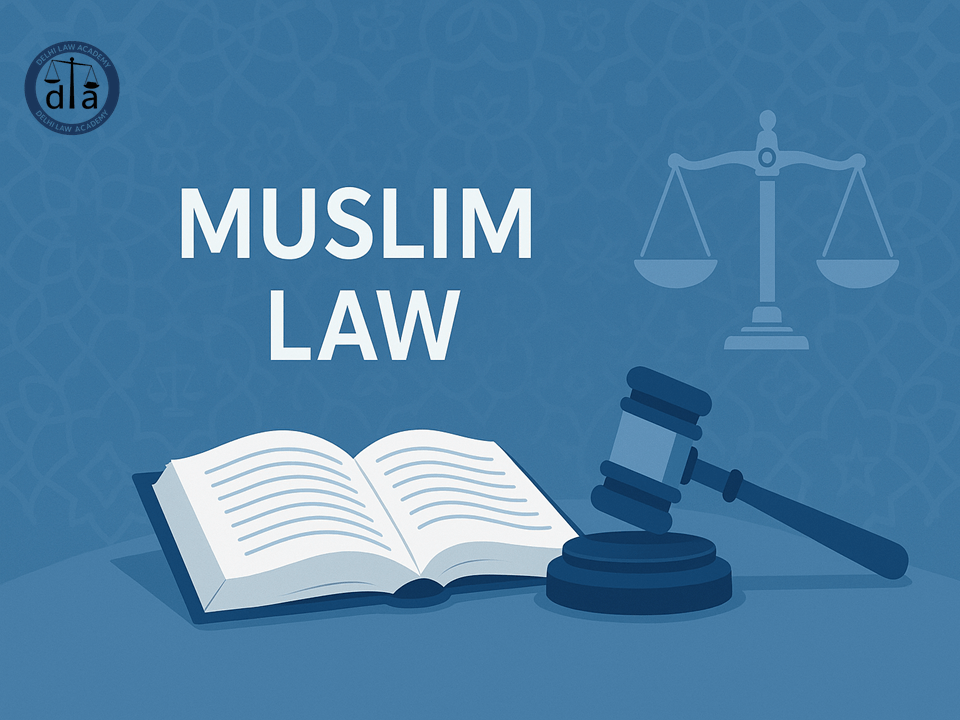
📘 Preparation for RJS, DJS, PCS (J) and other Judicial Service exams
⚖️ CONSTITUTIONAL VALIDITY OF THE MUSLIM WOMEN (PROTECTION OF RIGHTS ON DIVORCE) ACT, 1986
📜 DANIAL LATIFI v. UNION OF INDIA [2001 SC]
- The provisions of the Act do not offend Articles 14, 15 and 21 of the Constitution.
- A reasonable and fair provision extending beyond the iddat period must be made by the husband within the iddat period in terms of Section 3(1)(a) of the Act.
- Liability of Muslim husband to his divorced wife arising under Section 3(1)(a) of the Act to pay maintenance is not confined to iddat period.
Muslim Law is an important component of most Judicial Service exams in the country. Its thorough knowledge is a must for all aspirants of RJS, DJS, PCS (J) and other Judicial Service exams. To help such aspirants, DELHI LAW ACADEMY JAIPUR has launched a series of study material modules on all important aspects of this important part of their syllabus:
📘 DANIAL LATIFI v. UNION OF INDIA [2001 SC]
Bench strength: 5
The constitutional validity of the Muslim Women (Protection of Rights on Divorce) Act, 1986 is in challenge before us in these cases.
Sections 3 and 4 are the principal sections which are under attack before us.
A reading of the Act will indicate that it codifies and regulates the obligations due to a Muslim woman divorcee by putting them outside the scope of Section 125 CrPC as the divorced woman has been defined as Muslim woman who was married according to Muslim law and has been divorced by or has obtained divorce from her husband in accordance with the Muslim law.
The maintenance under the Act is to be paid by the husband for the duration of the iddat period and this obligation does not extend beyond the period of iddat. Once the relationship with the husband has come to an end with the expiry of the iddat period, the responsibility devolves upon the relatives of the divorcee.
A careful reading of the provisions of the Act would indicate that a divorced woman is entitled to a reasonable and fair provision for maintenance. It was stated that Parliament seems to intend that the divorced woman gets sufficient means of livelihood, after the divorce and, therefore, the word provision indicates that something is provided in advance for meeting some needs. In other words, at the time of divorce the Muslim husband is required to contemplate the future needs and make preparatory arrangements in advance for meeting those needs. Reasonable and fair provision may include provision for her residence, her food, her clothes, and other articles. The expression within should be read as during or for and this cannot be done because words cannot be construed contrary to their meaning as the word within would mean on or before, not beyond and, therefore, it was held that the Act would mean that on or before the expiration of the iddat period, the husband is bound to make and pay a maintenance to the wife and if he fails to do so then the wife is entitled to recover it by filing an application before the Magistrate as provided in Section 3(3) but no where the Parliament has provided that reasonable and fair provision and maintenance is limited only for the iddat period and not beyond it. It would extend to the whole life of the divorced wife unless she gets married for a second time.
The crux of the matter is that the divorced woman shall be entitled to a reasonable and fair provision and maintenance to be made and paid to her within the iddat period by her former husband. The wordings of Section 3 of the Act appear to indicate that the husband has two separate and distinct obligations: (1) to make a reasonable and fair provision for his divorced wife; and (2) to provide maintenance for her.
The emphasis of this section is not on the nature or duration of any such provision or maintenance, but on the time by which an arrangement for payment of provision and maintenance should be concluded, namely, within the iddat period. If the provisions are so read, the Act would exclude from liability for post-iddat period maintenance to a man who has already discharged his obligations of both reasonable and fair provision and maintenance by paying these amounts in a lump sum to his wife, in addition to having paid his wife’s mahr and restored her dowry as per Section 3(1)(c) and 3(1)(d).
A comparison of these provisions with Section 125 CrPC will make it clear that requirements provided in Section 125 and the purpose, object and scope thereof being to prevent vagrancy by compelling those who can do so to support those who are unable to support themselves and who have a normal and legitimate claim to support is satisfied.
Even under the Act, the parties agreed that the provisions of Section 125 CrPC would still be attracted and even otherwise, the Magistrate has been conferred with the power to make appropriate provision for maintenance and, therefore, what could be earlier granted by a Magistrate under Section 125 CrPC would now be granted under the very Act itself. This being the position, the Act cannot be held to be unconstitutional.
In Shah Bano’s case this Court has clearly explained as to the rationale behind Section 125 CrPC to make provision for maintenance to be paid to a divorced Muslim wife and this is clearly to avoid vagrancy or destitution on the part of a Muslim woman. The contention put forth on behalf of the Muslims organisations who are interveners before us is that under the Act vagrancy or destitution is sought to be avoided but not by punishing the erring husband, if at all, but by providing for maintenance through others. If for any reason the interpretation placed by us on the language of Sections 3(1)(a) and 4 of the Act is not acceptable, we will have to examine the effect of the provisions as they stand, that is, a Muslim woman will not be entitled to maintenance from her husband after the period of iddat once the Talaq is pronounced and, if at all, thereafter maintenance could only be recovered from the various persons mentioned in Section 4 or from the Wakf Board.
While upholding the validity of the Act, we may sum up our conclusions:
- A Muslim husband is liable to make reasonable and fair provision for the future of the divorced wife which obviously includes her maintenance as well. Such a reasonable and fair provision extending beyond the iddat period must be made by the husband within the iddat period in terms of Section 3(1)(a) of the Act.
- Liability of Muslim husband to his divorced wife arising under Section 3(1)(a) of the Act to pay maintenance is not confined to iddat period.
- A divorced Muslim woman who has not remarried and who is not able to maintain herself after iddat period can proceed as provided under Section 4 of the Act against her relatives who are liable to maintain her in proportion to the properties which they inherit on her death according to Muslim law from such divorced woman including her children and parents. If any of the relatives being unable to pay maintenance, the Magistrate may direct the State Wakf Board established under the Act to pay such maintenance.
- The provisions of the Act do not offend Articles 14, 15 and 21 of the Constitution.
📚 Continue Your Muslim Law Preparation
Don’t stop here! Strengthen your knowledge of Muslim Law with our blogs:
📘 Free Study Material for Judiciary Aspirants!
Download our FREE study material prepared by Delhi Law Academy’s expert faculty.
💡 FAQs on Muslim Women (Protection of Rights on Divorce) Act, 1986
Contact us
📍 Delhi Law Academy – Jaipur Branch
6C, Tower 2, Coaching Hub, Pratap Nagar, Jaipur – 302033
📞 Phone:
+91 9911916552
+91 8447285606
✉️ Email:
contactus@delhilawacademy.com

